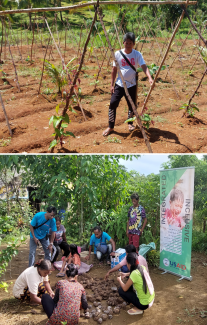When Ariel Pandenio thinks back on his childhood years, he remembers the Montible watershed in his home province of Palawan as a lush and vibrant forest teeming with wildlife like the Philippine cockatoo and the rare, albino Philippine long-tailed macaque. He and his tribe, the Tagbanua of Palawan, consider the forests sacred, and the abundant natural resources—including water—made life in the past “more bountiful.”
But over the years, Ariel has witnessed the transformation of this once-verdant sacred site into a forest ravaged by uncontrolled agricultural expansion and extreme weather events caused by climate change. The degradation of the forests inevitably pushed some indigenous people to resort to unsustainable methods of slash-and-burn farming just to survive. “The fish from the river, the fruits you eat, the flowing water – they used to be within reach and free. Now we need to buy them at a hefty price,” said Ariel. “Life was good for us in the past when the watershed was healthier.”
Ariel’s experience mirrors the situation in many other watersheds in the Philippines. A decade ago, the Institute of Environmental Science for Social Change estimated that over half of the country’s major watersheds were critically deforested. Despite these challenges, many indigenous people continue to play the role of watershed stewards. However, without adequate support from the government and other sectors, indigenous peoples may also resort, wittingly or unwittingly, to livelihoods harmful to the watershed.
Through its 2022-2030 Climate Strategy, USAID is promoting nature-based solutions as key tools to support livelihoods, improve food and water security, and absorb harmful emissions. Recognizing the importance of indigenous peoples’ meaningful participation and active leadership, USAID also strengthens partnerships to support the communities’ shift to nature-based solutions. In the Philippines, USAID, through its Safe Water project, partners with the private sector and civil society organizations to give these communities alternatives to harmful livelihood practices, help them earn a higher income, and provide them the opportunity to conserve and protect the watershed.
For indigenous people like Ariel, the importance of sustainable and productive landscapes is gaining ground.
Sustainable Ube Production
Lacking the knowledge and technology for sustainable farming practices, Ariel shared several of the tribe’s failed attempts to abandon slash-and-burn farming and shift to other agricultural practices. “I remembered planting ube (purple yam) before and waiting over a year before harvesting it. By that time, its branches started to wilt. When I harvested the root crop, it was already being eaten by termites,” he explained. When they did get a successful harvest, Ariel and other farmers also struggled to find markets in which to sell their produce.
To help Ariel and his tribe better understand and implement effective and sustainable farming practices, USAID connected Ariel and his tribe to Sunlight Foods Corporation (SFC). SFC trained Ariel and other farmers on proper ube farming practices that follow international standards for sustainability in farming. Through proper cultivation, soil management, and use of organic fertilizers and pest control materials, indigenous farmers like Ariel could ensure good ube crops and also help prevent soil erosion and protect groundwater quality. SFC also agreed to buy all of the tribe’s produce at fair market prices. “When USAID connected us to SFC, we learned effective and environment-friendly methods of growing ube,” said Ariel. “Now, my fellow Tagbanua farmers feel secure investing in ube farms, since SFC has agreed to buy all our produce,” said Ariel.
Over 70 local farmers’ organizations—primarily composed of indigenous people—now grow sustainable ube and sell their produce to SFC, which is a major supplier of ice cream shops, bakeshops, and fast food chains. USAID and SFC are also working with the Institute for the Development of Educational and Ecological Alternatives, Inc. to train three local associations on ube processing so they can make products such as ice cream, ube pie, and jam.
Thanks to USAID support, Ariel and his tribe not only have higher incomes, but also have abandoned slash-and-burn farming, allowing the forests and watersheds to begin recovering. “With stable income, we are motivated to protect our watershed. We realize that without it, we won’t be able to grow our ube,” said Ariel. “At the same time, we want our children and their children to enjoy the natural resources of the watershed—and not just hear stories about them.”

USAID
